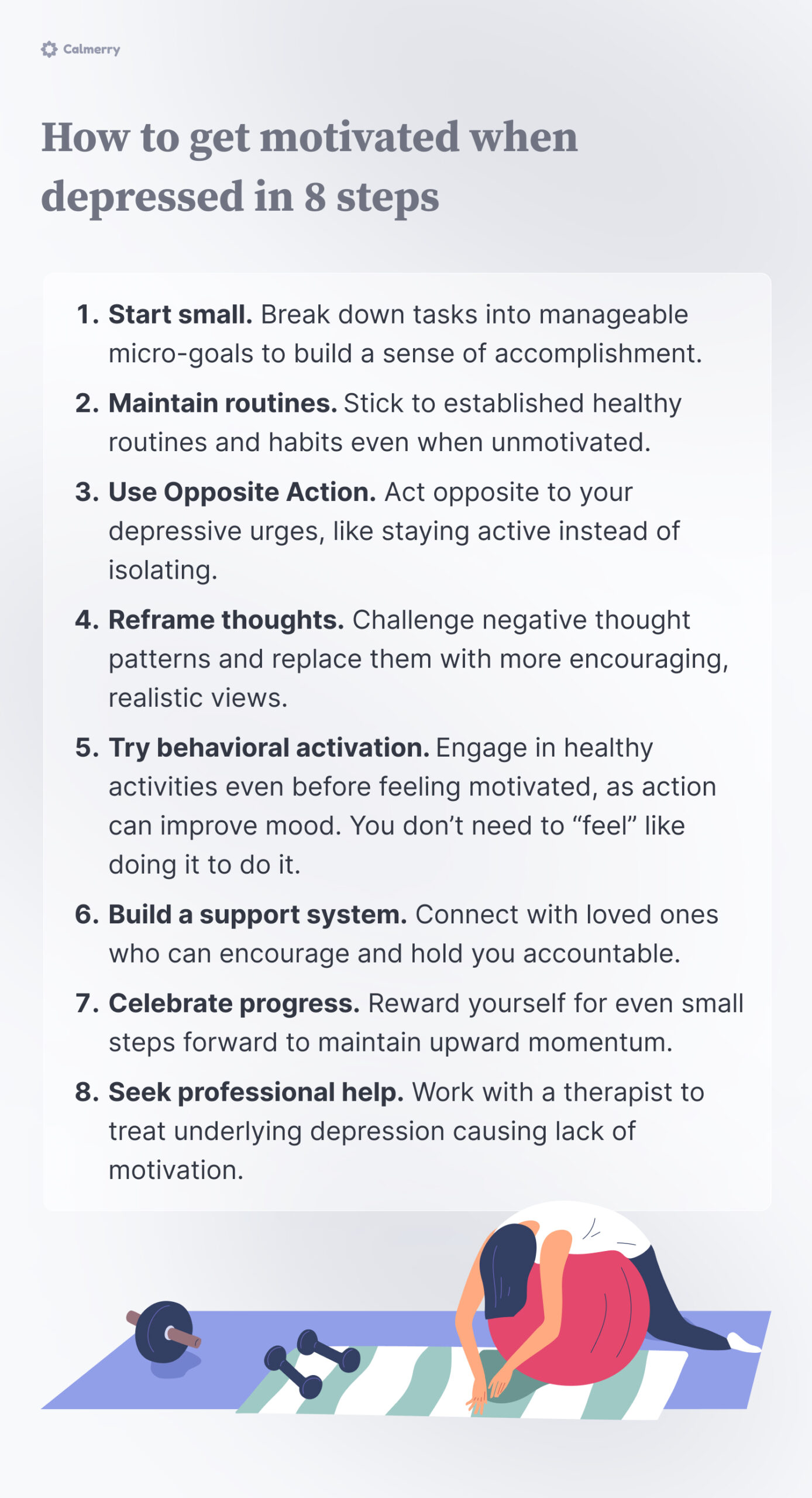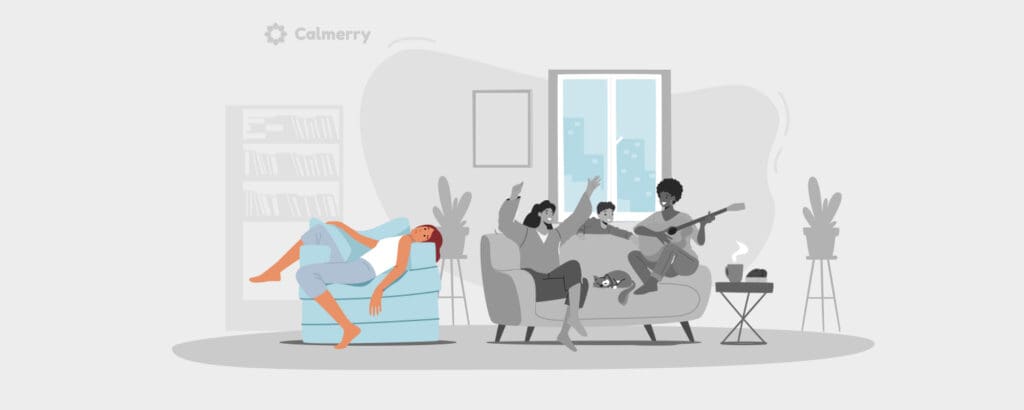How to Get Motivated When Depressed: 8 Manageable Steps

In this article
If you live with depression, then you already know that a lack of motivation is one of the most challenging parts to live with. Depression can cause symptoms like fatigue and loss of interest in activities that can sap you of all motivation to do anything.
But there are ways that you can get your motivation and zest for life back, including addressing underlying depression symptoms and using self-help techniques.
Here, we’ll give you 8 actionable steps that can help you get motivated again, even during a depressive episode.

1. Start with small, manageable goals
Depression can often make us feel overwhelmed. Even tasks that are “easy” on the surface may feel insurmountable when you’re in a depressive episode.
For example, you might typically keep your house tidy. But when you’re facing depression symptoms, even keeping one area clean might feel completely overwhelming.
To combat this, keep your goals small and realistic. A goal of “washing the dishes” may be difficult to gather motivation for when you’re depressed. Smaller steps might be to put all of the dishes in the sink, clear the dishwasher, or wash just one dish.
Once you have your list of manageable goals, start with the smallest and easiest ones.
You might be tempted to get the harder steps out of the way first – and if you’re feeling motivated enough to do so, then you can try this – but generally, starting with the easiest steps helps you gain a sense of mastery and accomplishment. This can help you feel more confident to tackle the other, more challenging goals on your list.
Revisiting the example above, if gathering all the dishes in the sink feels too overwhelming, start with something easier, like clearing the dishwasher.
If it’s still difficult to feel motivated, start with something even more manageable, like taking just one dish out of the dishwasher.
2. Stick to your routine
Having a healthy routine and sticking to it can be immensely helpful during a depressive episode.
Routines consist of habits, and habits are behaviors that you can repeat without even thinking about it. When you’re depressed, it’s typically easier to stick to a familiar routine than to implement new habits.
It’s best to start building a healthy routine when you’re not in a depressive episode. Fill your regular daily routine with healthy habits, like taking a walk after work, journaling in the morning, winding down for bed an hour before you go to sleep, and calling friends on certain days.
When you already have a solid routine built up, it may be easier to stick with it, even when depression saps you of all motivation.
– Saya Des Marais, MSW, Therapist-turned-mental health writer
3. Engage in Opposite Action
Opposite Action is a technique from dialectical behavior therapy (DBT), which is an evidence-based treatment method for people facing severe depression and suicidal thoughts.
This technique teaches you how to regulate your emotions by changing your behavior.
The basis of Opposite Action is that every emotion comes with an “action urge.”
For example, if you feel afraid, you may have the urge to run away. If you feel angry, you may feel the urge to yell or attack. If you’re ashamed, you may feel the urge to hide.
In Opposite Action, you can change the emotion by acting in a way that’s the direct opposite to the action urge.
When you feel depressed, the action urges may be to self-isolate, to stay in bed, or to use unhealthy coping mechanisms like substance use.
Using Opposite Action, you can:
- First, acknowledge the emotion (depression, sadness, hopelessness, etc.) and the action urges associated.
- Then, ask yourself if expressing the emotion in this way would be effective. Would these actions make you feel better?
- If not, use Opposite Action – do an action that’s the direct opposite of the action urge. For this example, some possibilities might be to reach out to friends, get out of bed, or avoid substances.
- Repeat Opposite Action until the emotion changes.
4. Reframe unhelpful and negative thoughts
Negative thoughts can often get in the way of motivation, especially when you live with depression. Depression can cause you to fall into unhelpful thinking traps.
You might have thoughts like:
- I’m a loser.
- I’m so lazy. I barely did anything today.
- Why can’t I just get up and do this?
- Even if I do this, it won’t make a difference.
- Nothing will ever make me feel better.
- My friends don’t want to see me anyway.
However, these thinking patterns are not rooted in objective truth, and can cause a lack of motivation to become even worse. It’s important to know how to challenge and reframe these thoughts that are getting in your way.
For example, you could reframe the above thoughts as:
- I’m just a human being with a mental health condition. I’m doing my best.
- I was able to brush my teeth and shower today. That’s an accomplishment.
- Depression is making me feel a lack of motivation. It’s important to be kind to myself.
- Based on scientific research as well as my own past experiences, I know that if I go spend time in nature, I may feel better.
- I have depression, but depression is manageable. There are effective treatments out there that have been found to help.
- I have no evidence that my friends don’t want to see me. They have only ever shown me love and support.
5. Use behavioral activation
Behavioral activation is a cognitive-behavioral (CBT) technique based on the idea that often, behavior precedes emotion. In other words, you might feel now like you’re too depressed to do anything – you don’t want to see friends, exercise, or go outside.
Behavioral activation teaches that you don’t need to wait for an emotion to change your behavior. In other words, you don’t need to “feel” like doing it to do it. Often, the behavior comes first – if you can see friends, exercise, or go outside even while feeling depressed, then you’re likely to feel better afterwards.
This is helpful for people with depression because depression and motivation can often get locked in a vicious, self-perpetuating cycle. You don’t feel the desire to exercise or socialize when you’re depressed, so you don’t. But the longer you go without these healthy habits, the worse you feel – and you’re even less likely to engage in these habits.
Behavioral activation is one of the best ways to break this cycle. Try to do these healthy things anyway, even when you don’t want to. You don’t need to wait to feel better to change your behavior.
– Saya Des Marais, MSW, Therapist-turned-mental health writer
6. Connect with a supportive environment
One of the best things you can do for your overall mental health is to connect with supportive people. Research shows that people who feel like their environments are supportive are more likely to be motivated. [1] Tezci, E., Sezer, F., Gürgân, U., & Aktan, S. (2015). A study on social support and motivation. the Anthropologist/Anthropologist, 22(2), 284–292. https://doi.org/10.1080/09720073.2015.11891879
In other words, you’re more likely to feel motivated when your closest loved ones are around you, cheering you on.
Unfortunately, social support and depression have a complex relationship and can get locked in a negative cycle. You need support the most when you’re depressed, but depression may make you feel unwanted or cause you to self-isolate.
– Saya Des Marais, MSW, Therapist-turned-mental health writer
It’s important not to give into the temptation to isolate when you live with depression. Remember the behavioral activation technique – even if you don’t feel the desire to connect with others, doing it anyway can change your emotions.
Reach out to loved ones. Schedule time to call them or spend time with them. Let them know your goals, and ask them to keep you accountable. This can help you stay motivated.
7. Reward yourself for small steps
It’s important to be your own cheerleader when it comes to depression. Celebrate every win, even the smallest ones. Reframe any negative thoughts that tell you that these small steps don’t count. Every step counts when you’re battling depression.
For example, maybe you’re in a depressive episode and have the goal of going to the gym and running 5 miles. You’re able to change into your gym clothes but feel too unmotivated and depressed to actually drive to the gym.
It’s easy to judge yourself for this. You may have thoughts like, “I’m a failure. I didn’t meet my goal.” But these thoughts are likely to only make you more depressed. Instead, reframe and affirm yourself for the step you did take: “I was able to change into gym clothes. That’s more than I could do yesterday.”
Reward yourself for these small steps. This can build an upward momentum of action and keep you motivated to continue making progress.
– Saya Des Marais, MSW, Therapist-turned-mental health writer
8. Seek professional help for depression and motivation
Lastly, don’t forget that depression is a chronic health condition that requires treatment just like any other.
Often, when we’re depressed, we tend to judge ourselves as “just lazy.” We may think we should just be able to become motivated and pull ourselves out of depression with sheer willpower.
The truth is that, without the right treatment, depression doesn’t tend to get better. Although these tips can help you feel more motivated when you’re depressed, it’s also important to address the root cause of the lack of motivation: depression (and possibly other mental health conditions).
It’s not your fault that you live with depression, and you deserve support.
A therapist can help address underlying depression using tools like cognitive-behavioral therapy and acceptance and commitment therapy. In therapy, you can learn different ways of managing depression symptoms and build an activity plan that you can stick to even when depression causes a complete lack of motivation.
A word from Calmerry
At Calmerry, we understand how debilitating depression can be and how it can sap your motivation and zest for life.
Our team of licensed therapists is here to help you through this challenging time. With online therapy for depression, you can access professional support from the comfort of your own home, on your own schedule.
Our therapists specialize in evidence-based treatments like cognitive-behavioral therapy and acceptance and commitment therapy, which have been proven effective in managing depression and regaining motivation.
Don’t hesitate to reach out – we’re here to match you with your therapist within 1 hour.
Tezci, E., Sezer, F., Gürgân, U., & Aktan, S. (2015). A study on social support and motivation. the Anthropologist/Anthropologist, 22(2), 284–292. https://doi.org/10.1080/09720073.2015.11891879
online therapy
live video session




